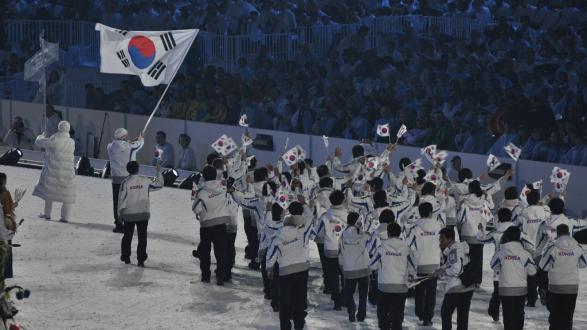The 2018 Winter Olympics in PyeongChang were a rare moment to see North Korea participating on the world stage in cooperative manner, experts told Pacific Council members in a teleconference, adding that the Games were an opening for the United States to shift the momentum towards dialogue and away from tension.
The call featured Ms. Shihoko Goto, senior associate for Northeast Asia at the Wilson Center, and Mr. Christopher Green, senior advisor on the Korean Peninsula at the International Crisis Group, and was moderated by Ms. Gloria Koo, associate director of the Korean Studies Institute at the University of Southern California.
North Korea is still the greatest global threat, they added—that has not changed. What has changed, however, is that the South Koreans are now working in a cooperative manner with Pyongyang. Goto made clear that "North Korea is far from an irrational actor." In fact, she went so far to say that Pyongyang has "played the ‘diplomatic card’ admirably well" and has been consistent in what they want, which is the survival of their regime and "recognition—and above all respect—from the international community."
"If we’re not careful, this [diplomatic progress on the Korean Peninsula due to the Olympics] could lead absolutely nowhere."
Christopher Green
Green noted that the establishment of a hotline between Seoul and Pyongyang, as well as the confirmation of the upcoming Inter-Korean Summit on April 27, were great steps forward in decreasing tensions on the Korean Peninsula. This "Winter Olympics rapprochement" has, in Green’s view, the potential to lead to some kind of stable forum for dialogue. Barring that, this pause could, at the very least, extend the current détente long enough to explore further options on the Korean Peninsula. "However," Green, continued, "if we’re not careful, this could lead absolutely nowhere."
The resounding sentiment from Green and Goto was that Kim Jong-un, and thus North Korea, is a rational actor, utilizing the diplomatic opening that the Olympics provided. Kim is working to serve his own interests, they said, as well as the goal that North Korea has always held: getting U.S. troops off of the Korean Peninsula.
The speakers also noted that diplomatic engagement with South Korea works for North Korean internal propaganda, as it shows Kim working at a high level with South Koreans and possibly the United States. It further legitimizes him in North Korean politics, and also legitimizes his government to the outside world. The so-called "charm offensive" Kim employed at the Winter Olympics helped set this external legitimacy in motion by humanizing North Korea.
"The flags of unity waved by Koreans during the PyeongChang Games was a symbol of goodwill to many South Koreans but also controversy and tension for those who thought this move went too far."
Shihoko Goto
"The flags of unity waved by Koreans during the PyeongChang Games was a symbol of goodwill to many South Koreans but also controversy and tension for those who thought this move went too far," said Goto.
Green agreed, adding that recent diplomatic moves still serve the North’s strategy and pointing out that "North Korea broadcast a 10-minute film about the meeting with South Korea as part of its propaganda efforts" the night before the teleconference.
The issue of where China fits in was also raised during the discussion. Green said that China has stated support for inter-Korean dialogue, though they have not been overly-enthusiastic about it.
"China is sufficiently perplexed by the Trump administration, and sufficiently concerned of the possibility, however small, that the Trump administration will put boots on the ground in North Korea," said Green, referencing the recently-floated "bloody nose" strategy.
The experts also said that the United States, Japan, and South Korea need to figure out what each government wants. Do they want regime change and a push for reunification? What kind of North Korea is the United States envisioning? Japan and South Korea want security and stability in Northeast Asia, but besides that, no one is certain. If these three parties do not figure out what each country wants, then they won’t be able to come to a consensus, which benefits North Korea.
It is too early to tell whether or not the Olympic diplomacy was successful. Only if something durable comes out of this will it be declared a success.
Goto said that South Korean President Moon Jae-in has been able to counter the wedge that Pyongyang has sought to drive between South Korea, Japan, and the United States. He has done this by maintaining dialogue with the United States and Japan, as well as with China.
Through the North Korean charm offensive and South Korea’s push for dialogue and decreased tensions, the Olympics provided a space for diplomatic engagement to take place. However, according to Green and Goto, they did not concretely repair relations on the Korean Peninsula, and it is too early to tell whether or not the Olympic diplomacy was successful. The Olympics were the playing field where these actions took place, not a driver of repaired relations, and only if something durable comes out of this will it be declared a success.
Listen to the full conversation below:
_______________________
The views and opinions expressed here are those of the speakers and do not necessarily reflect the official policy or position of the Pacific Council.




